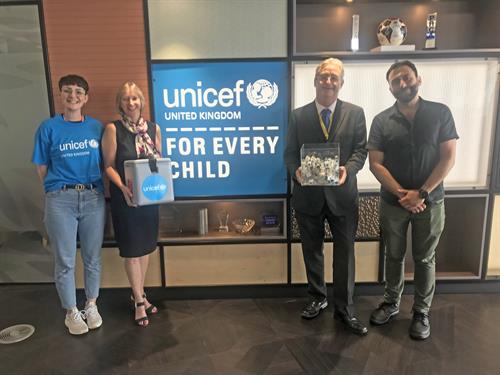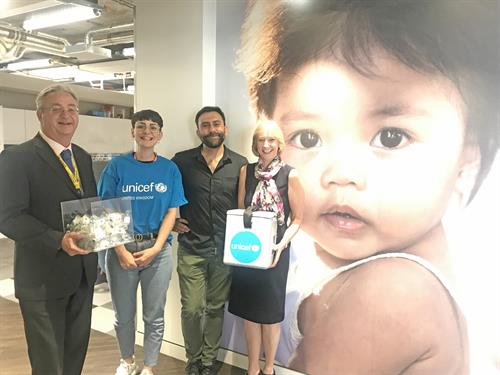by
User Not Found
| Sep 03, 2019

Staff at Cambridgeshire Community Services NHS Trust rallied round in their support of Unicef UK’s child vaccination programmes last winter, simply by receiving their own Flu jab.
As part of the ‘Get A Jab – Give A Jab’ campaign, the Trust pledged to donate vaccines to Unicef UK on behalf of all staff members who received their FREE influenza vaccination, either through the Trust, their GP or local pharmacy.
By receiving their FREE vaccination to protect themselves, their families and their patients against influenza during winter 2018-19 staff donated 3,450 vaccines to Unicef UK to help fight measles, tetanus and polio around the world. The donation breaks down to 1150 doses of measles vaccines, 1150 doses of tetanus vaccines, 1150 does of polio vaccines and 23 large vaccine carriers to keep the vaccines cold and effective.
Since vaccines were introduced in the UK, diseases like smallpox, polio and tetanus that used to kill or disable millions of people are either gone or seen very rarely. Other diseases like measles and diphtheria have been reduced by up to 99.9% since their vaccines were introduced.
However, many for these diseases are still prevalent in poorer parts of the world. Unicef UK’s immunisation programme protects children against these serious diseases and vaccines play a central role in ending preventable child deaths.
Over 1.5 million children die annually from diseases that can be prevented by vaccination and nearly one in five infants in poorer countries miss out on the basic vaccines they need to stay alive and healthy.
The donation made by staff at Cambridgeshire Community Services NHS Trust will help fight these statistics and ensure Unicef UK can ensure every child around the world has the right to survive and thrive.
Julia Curtis, Chief Nurse for Cambridgeshire Community Services NHS Trust said: “By protecting themselves and our patients, our staff have helped provide protection to some of the most vulnerable children in the world.
“The seemingly easy and simple task of getting their flu jab has meant that the Trust has donated a phenomenal amount of vaccines to Unicef.
“I want to thank our staff for getting behind this campaign and hope that we can go on to provide more flu vaccinations and therefore donate even more vaccines to Unicef UK this coming flu season.”
Heidi Bartlet, Children’s Occupational Therapist Team Lead said: “I have the flu jab every year as I work with children who would be vulnerable if staff did not protect their own health.
“The fact that the Trust has donated vaccinations to Unicef UK on my behalf is brilliant. It’s such an easy thing for me to do to get my flu jab and in doing so I’m protecting the children I work with and others worldwide.”
Oscar Serrano Oria, Nutrition and Early Child Development Specialist for Unicef UK said: “The kind donation received from the Cambridgeshire Community Services NHS Trust enables Unicef UK to reach the most vulnerable children in the world, and contributes to saving three million children’s lives every year due to safe and effective immunisation.
“The Get a Jab, Give a Jab initiative is a brilliant way to make a tangible difference to communities who would otherwise not be able to receive these life-saving vaccines.”
ENDS

(L-R) Chris Sharp, Cambridgeshire Community Services NHS Trust Matron for Infection Prevention and Control, Steffi Camm, Unicef UK Fundraising Officer, Oscar Serrano Oria, Unicef UK Nutrition and Early Child Development Specialist and Julia Curtis, Cambridgeshire Community Services NHS Trust Chief Nurse.